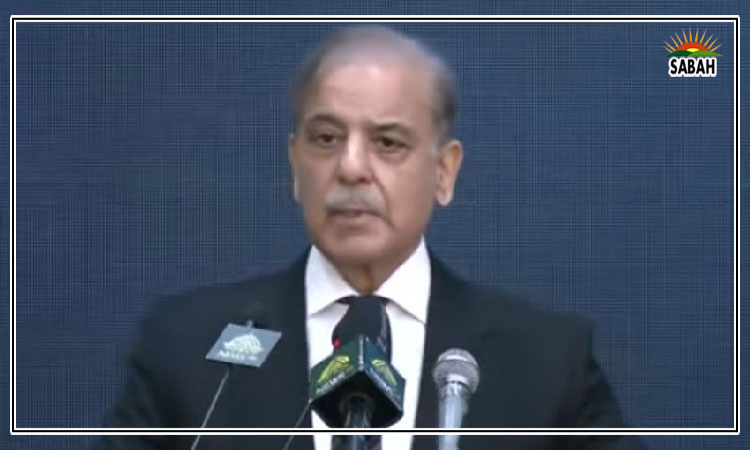Deeds not words…By Mir Adnan Aziz
Words matter only if buttressed by deeds. The sublime phrase acta non verba – deeds not words – is attributed to Julius Caesar. Chaucer reiterated it in his General Prologue of The Canterbury Tales saying words must be closely related to deeds.
Another report released by the National Commission for Human Rights states that 40 per cent Pakistanis want to leave the country. The reasons: political and economic instability, lack of employment opportunities and insecurity.
The report cites a 280 per cent increase of those traveling illegally to Europe in the first 10 months of 2022. Unsuccessful in going abroad through legal means, those who succumb to the many push factors fall prey to human smugglers. They are charged around $3 million per individual for a promised safe passage. It often ends in tragedy.
Only last year we mourned the over 300 Pakistanis who perished aboard the Adriana in the Mediterranean. The flag flew forlornly at half-mast. PM Shehbaz Sharif declared iron-fisted reprisals. Images of handcuffed individuals purported to be human smugglers were flashed to lend credence to the tip-of-the-tongue words. Our lives being a mere statistic, the verbose soon receded into silence till our next tragedy.
In February this year, we lost more lives in the same way. This month saw a set of people forced by the same push factors board yet another floating deathtrap. Nearly 50 died including 13-year-old Abid and 19-year-old Sufyan. The same litany of statements and antics followed doing nothing but mocking the tragedies of our lives.
This heartless choreography seems all the more frivolous given that not an iota of intent is evident to alleviate the push factors of these repeated tragedies. All we hear ad nauseam is how the economy, PSX-like, is soaring, billions are being invested and perish those who thought the economy would default. To paraphrase Shakespeare’s Touchstone the jester “The fool doth think he is wise, but the wise man knows himself to be a fool.”
Through the ages, the central role of women has ensured stability, progress and long-term development in nations. Our women constitute just 22.63 per cent of our workforce. Eighty-one per cent of the 5.26 million people employed in our informal sector are females working in unchecked bonded labour conditions.
Unicef warns that 11 million under-five children in Punjab alone are affected by the yearly toxic smog. Twelve per cent of deaths in children under this age bracket are attributed to air pollution. Pakistan and Afghanistan are the only two countries where poliovirus Type 1 is still endemic. Despite this, in September this year, more than one million children missed their vaccination doses.
Around 26.2 million of our children are out of school and 5.95 million do not receive higher secondary education – an indictment of the vaunted 18th Amendment passed 14 years ago whose Article 25A mandated free education for children. If these most vulnerable cannot command sincere deeds; what can we expect other than meaningless words?
Recently, the Punjab CM launched the Nawaz Sharif IT City promising world-class architecture and amenities. It was claimed that many tech giants were interested in it. Technology is based on intellect. It thrives in an enabling environment, not in grandiose brick-and-mortar structures.
Digitisation is an imperative of modern-day governance. The government recently tabled the Digital Nation Pakistan Bill claiming the intent to centralise social, economic and governance data. Dichotomy galore, the government is doing exactly the opposite by arbitrarily tampering with and undoing the required foundational infrastructure.
This has seen tech companies and freelancers facing delivery, credibility and financial losses, e-commerce activity has drastically declined, online students are suffering and multinationals are quitting Pakistan. Is this an environment that will attract tech giants?
In 1913, Britain passed the Prisoners Temporary Discharge for Ill-Health Act. It allowed women detained for suffrage protests and on hunger strike to be released if at risk of death. On recovery, they were to be recalled to prison. They could be released and arrested for the same offence repeatedly.
The law gained notoriety as The Cat and Mouse Act. The Women’s Social and Political Union (WPSU) rallied against it with the slogan, deeds not words. With WPSU gaining public support, the Act was abandoned at the start of the 1914 Great War. In 1918, British women were granted voting rights.
Yet another thing being flaunted as an achievement is the UN recently adopting Pakistan’s resolution reaffirming the inalienable right to self-determination. Our precarious state of affairs owes much to denial of the same. It is compounded by sledgehammer tactics, opaque trials and cat-and-mouse decrees.
The World Justice Rule of Law Index measures crime control, protection from armed conflicts and the use of violence to resolve civil disputes. Its 2024 report ranks Pakistan at 140, above Mali and Nigeria only, in terms of law, order and security.
Dissent is the safety valve of democracy. It is the latitude to air grievances and governmental action to alleviate the same. No wonder French scholar Ernest Renan defined a nation’s existence as a daily plebiscite.
Mental constructs are what poet William Blake defined as mind-forged manacles. The people have realised that their predicament emanates at the hands of those who are the masters of their destinies. The construct that now binds us as a people is that our lives are deemed worthless by the power-elite. Their words and deeds have remained an oxymoron.
The emotions evoked are tormenting ones. To paraphrase Frederick Douglass Keith, a statesman and reformer par excellence born into slavery: “What country have I? The institutions of this country do not know me, do not recognise me as a man”.
COURTESY













